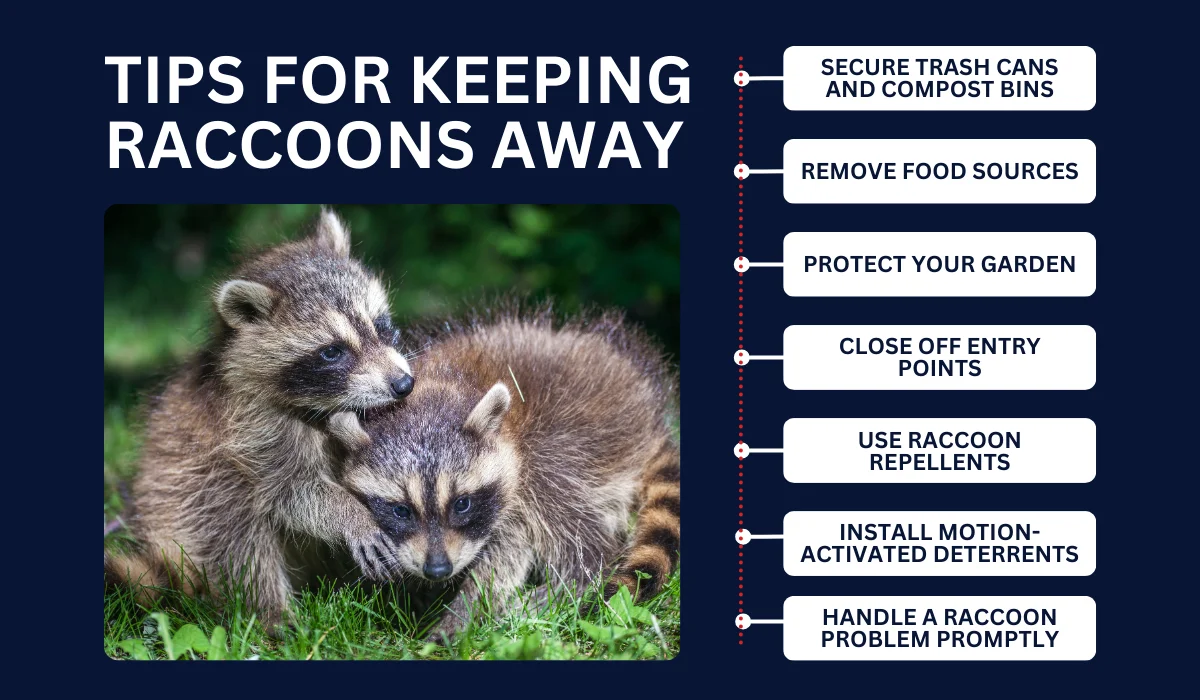Introduction
Raccoons can be a persistent nuisance in gardens, causing damage to plants, digging up soil, and raiding fruits and vegetables. These clever mammals are attracted to gardens because of easy access to food and shelter. Learning how to repel raccoons from your garden is essential to protect your plants without harming the animals. This article explores expert-backed, humane methods to keep raccoons at bay while maintaining a thriving garden.
Why Do Raccoons Invade Gardens?
Understanding raccoon behavior helps in designing effective deterrents. Raccoons are nocturnal omnivores that seek out gardens for:
- Fruits and vegetables: Tomatoes, corn, berries, and melons are common targets.
- Insects and grubs: Soil disturbed by raccoons often contains insects that attract them.
- Shelter: Dense shrubbery or garden debris offers hiding spots.
By knowing what attracts raccoons, gardeners can tailor their prevention strategies accordingly.
Proven Methods to Repel Raccoons from Your Garden
1. Physical Barriers
Installing barriers is one of the most effective ways to keep raccoons out. Consider:
- Fencing: Use 4-6 feet tall fences made of sturdy wire mesh. Bury the bottom 6-12 inches underground to prevent digging.
- Electric fences: Low-voltage electric fencing can deter raccoons without causing injury.
- Netting: Cover vulnerable plants with bird netting to protect fruits from being eaten.
2. Remove Food Sources
Eliminating easy food access reduces raccoon visits:
- Pick ripe fruits and vegetables promptly.
- Secure garbage bins with tight-fitting lids.
- Avoid leaving pet food outdoors overnight.
- Use compost bins designed to keep animals out.
3. Use Natural Repellents
Certain scents and substances repel raccoons:
- Ammonia or vinegar: Soak rags and place them around the garden perimeter.
- Garlic and hot pepper sprays: Homemade sprays can discourage raccoons from feeding.
- Predator urine: Commercially available coyote or fox urine can create a perceived threat.
Rotate repellents regularly to prevent raccoons from becoming accustomed.
Advanced Strategies and Expert Tips
Habitat Modification
Experts recommend reducing raccoon-friendly habitats:
- Clear brush piles and dense undergrowth.
- Remove fallen fruits and nuts from trees.
- Keep compost piles secure and away from garden beds.
Motion-Activated Deterrents
Technology offers innovative solutions:
- Motion-activated sprinklers: These startle raccoons with sudden water bursts.
- Ultrasonic devices: Emit high-frequency sounds unpleasant to raccoons but inaudible to humans.
Community and Legal Considerations
In some areas, raccoons are protected wildlife. It’s important to:
- Check local regulations before using traps or poisons.
- Engage with neighbors to manage raccoon populations collectively.
Real-World Success: Case Study
A community garden in Oregon experienced significant crop loss due to raccoons. By combining sturdy fencing, regular removal of fallen produce, and motion-activated sprinklers, they reduced raccoon intrusions by 85% within one growing season. Gardeners reported healthier plants and fewer disturbances, demonstrating the effectiveness of integrated deterrents.
Conclusion
Repelling raccoons from your garden requires a multi-faceted, humane approach. Physical barriers, removal of food sources, natural repellents, and habitat modification work best when combined thoughtfully. Utilizing motion-activated devices adds an extra layer of protection. Remember, raccoons are intelligent and adaptable, so persistence and variety in deterrent methods are key. Protect your garden while respecting local wildlife laws and the environment to ensure a flourishing garden free from raccoon damage.
